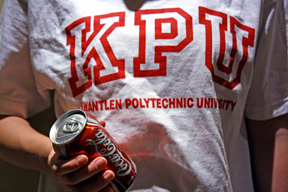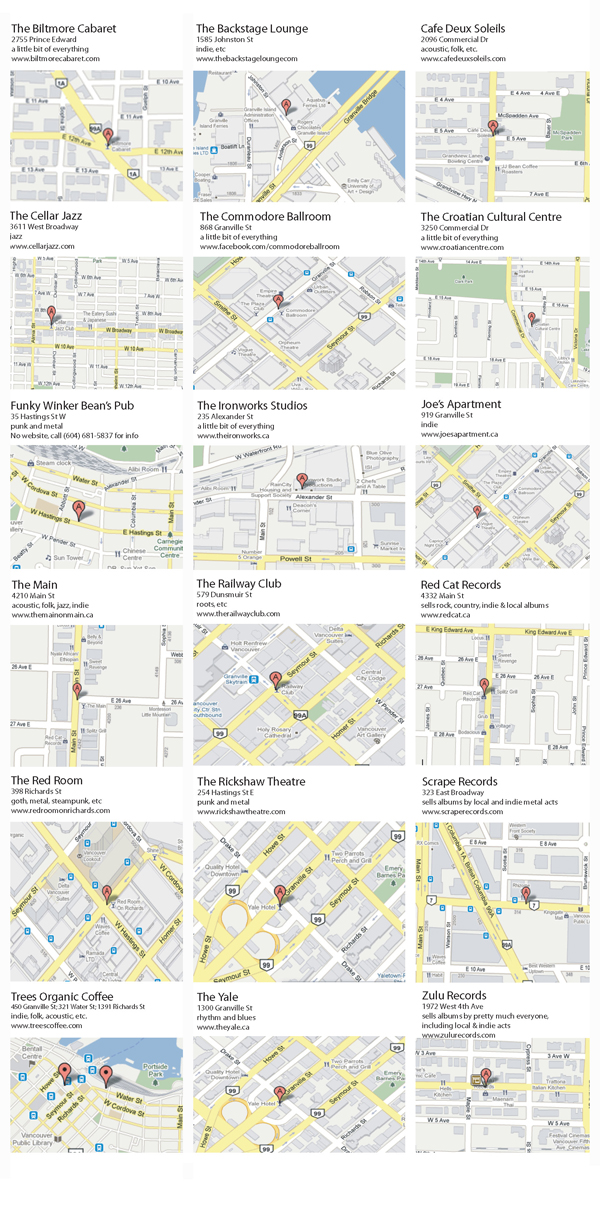What is Indie?
January 17, 2011 by Jocelyn Gollner · Leave a Comment
Where to find indie music in Vancouver (article below graphic):
Infographic by Amanda Punshon
We’ve heard about indie music, indie films, and other indie arts.
But what exactly does it mean?
It’s more than guys in tight jeans who listen to bands that no one has ever heard of.
Oswaldo Perez Cabrera is involved with the promotion and public relations for VanMusic.ca, a Vancouver-based website dedicated to giving exposure to indie bands.
He defines indie as being “all forms of art or culture that are outside of the mainstream media.”
Kwantlen students at the Richmond campus were also asked how they would describe indie, specifically indie music.
“Hmmm, that’s a good question,” said Alexandra Pastega, an English and marketing student. “Slightly acoustic. It has a kind of soft punk vibe to it in my opinion. Indie bands to me would constitute a band maybe like Metric. Kind of edgy but soft.”
Ian Nobak, a general studies student, said that indie means “independent. It would be maybe students making music, like downloading software and mixing it themselves.”
There is quite a difference, however, between a band such as Metric, which gets played on the radio, tours worldwide and has a large fan base, and students mixing music in their basement.
“There are people that start as indie and they move into more established companies,” Cabrera said. “There are other bands that prefer to keep it indie. Even some indie record companies, some indie labels, that start with a couple of bands, with their friends, and they become bigger and bigger. So then we have this question of how big they have to be to still be considered indie?”
It’s a question with no definitive answer. Everyone seems to have his or her own opinion.
But small or big, Cabrera believes that having independent artists is an important aspect to any city.
“Since [indie artists] don’t have any censorship or they aren’t subjected to what big companies are going to decide for them, it’s a very important voice to the culture of any city. It shows a little bit what the problems are in the city, it talks a bit about social issues, a lot of the time about environmental issues, they talk about what is happening in the subcultures of the city.”
He also believes that indie music is a form of resistance.
“It’s a resistance against the whole establishment. Because right now, most of radio and television, they tell you what to listen to, they tell you what to buy, they tell you how to think. And all these indie artists, it’s a resistance to all of that. Because they are talking about different things. They are talking about things that are contrary to what the establishment or what the mainstream is telling you to do. That’s a form of resistance.”
This is hardcore: Vancouver’s highly politicized DIY music scene through a founder’s eyes
January 17, 2011 by Amanda Punshon · Leave a Comment

Vancouver's DOA, founding fathers of hardcore. (Photo by Diane Foy, courtesy of Sudden Death Records)
By Amanda Punshon and Meagan Gill
Hardcore music is “a bunch of people screaming their heads off, playing fast. Screaming their heads off, playing fast and playing loud,” according to Joe (“Joey Shithead”) Keithley, founding member of legendary Vancouver hardcore band DOA. Hardcore has been one of Vancouver’s most vibrant music scenes for 33 years, and DOA has been there in one form or another for all of them. In fact, the band’s second album, Hardcore ’81, which was released in April 1981, is responsible for the use of the term “hardcore” as a description of their type of punk music.
Despite being an offshoot of punk, hardcore was influenced as much by folk and metal as punk itself. Keithley counts Iggy Pop, Lead Belly, Arlo Guthrie, Jimmy Hendrix and Black Sabbath as some of the musicians that most affected DOA’s music.
Perhaps the biggest, most important reason for the spread of hardcore was the conservatism of the ‘70s and ‘80s. Politicians such as Ronald Reagan in the States, Margaret Thatcher in England, Helmut Kohl in Germany and Brian Mulroney here in Canada formed “a quartet of idiots,” in Keithley’s words, that people reacted to strongly.
The political climate may be different now, but British Columbians still take social activism seriously, which, Keithley says, is one of the reasons that Vancouver’s hardcore scene continues to thrive.
“Let’s put it this way, if you’re not politically aware, you’re probably not really a punk band,” he says. “Some of the bands are into it, and they’ll play at rallies and protests and stuff like that. Not all of them…but I mean, it’s a part of activism within the punk rock scene.”
In addition to its politics, Vancouver is known for its arts scene.
“Vancouver is a happening place, arts-wise. It’s not surprising that you’d get kids who want to do something in music, they’d move out here. They probably don’t realize how tough it is or how expensive it is but they get out here and somehow they keep working on it,” Keithley says.
And it is tough. According to Keithley, it’s incredibly hard to get a record deal because major record labels no longer have the money or the sense of adventure that they did in the 1960s and ‘70s. They’re much less likely to take a risk on a band that’s not a sure thing.
In addition to that, big record store chains are increasingly less willing to stock albums by little-known bands, Keithley says. So many hardcore bands — DOA included — start their own record labels. Others turn to the Internet to distribute their material, which, for Keithley, is a mixed blessing.
“It’s hard to be heard, or what I say, get above the ‘noise floor.’ It’s kind of hard to get noticed because the most outrageous things have been done, the most screaming’s been done,” he says. But at the same time, “it’s good, the access is there, you can make an album a lot cheaper [than in the past.]”
When DOA was starting out, hardcore bands would play alongside new wave, reggae and pop punk bands. They had to in order to fill a room. But today, Vancouver hardcore has enough of a following that the lineups for most shows are filled by other hardcore bands.
Keithley is not sure what the future has in store for hardcore music in Vancouver. “It’ll just keep growing and morphing like it always does,” he says. “There’s always going to be a new bunch of kids coming along that make their own scene. I can’t predict that.”
But one thing is certain – “people are so passionate about [Vancouver hardcore],” Keithley says. “There’s a lot of support for it…there’s love there for it, and [at the same time] the support’s not there because there’s not a lot of money. It’s coming from the heart, and that’s a good thing.”
For more Chronicle coverage of independent arts in Vancouver, click here.
Kwantlen plans first-ever student trip to Ghana
January 17, 2011 by Max Hirtz · Leave a Comment
For the first time in its history, Kwantlen has organized a three-week field school in Ghana for any students who are interested and meet course requirements.
Charles Quist-Adade, the Kwantlen sociology professor responsible for organizing the trip, was born in Ghana and has an intimate knowledge of its culture.
He described Ghana as the most hospitable nation in Africa, noting that Ghanaians are generally friendly toward foreigners.
Quist-Adade believes that students learn by doing and prefers to see his students out of the classroom doing research that will “bring about change in the lives of real people.”
Applicants must be over the age of 19, have completed 45 credits and have a good student standing at the school they attend. They do not, however, need to be Kwantlen students.
The students will depart for Ghana on June 29 and will head home July 25. Before they leave, they will spend time preparing in the classroom.
For part of their trip, students will have the opportunity to work with non-government organizations that build homes for poor people and deliver health care to those in need.
They will also attend lectures by professors from the University of Ghana and the Ghana Institute of Journalism about the politics, history, culture and economy of the country.
Whatever time is left will be spent sightseeing, dancing and soaking up the Ghanaian culture.
“When we come back, they will organize a colloquium where they will share their experiences with the Kwantlen community, plus, of course, the wider African communities in the Lower Mainland,” said Quist-Adade.
Not including airfare, tuition and personal expenses, the trip will cost about $2,800. A $250 deposit is also required.
The deadline for applicants is Jan. 31.
Detailed information can be found on Kwantlen’s website.
Early Alert can lead to student success
January 17, 2011 by Stu Gallacher · Leave a Comment
Kwantlen Polytechnic University is raising the bar by providing more student success programs, such as the relatively new Early Alert program.
The first step in Early Alert is for an instructor to recognize that a student is having difficulty, which can range from poor attendance, to signs of distress and disruptive behaviour in class, underdeveloped study skills, or failing grades.
“It’s what we call an interventionist program, so we don’t leave it to chance for a student to get connected with services that can help them,” says Lyn Benn, Director for Student Development. “We’re one of the earlier institutions in Canada to put this program in.”
Early Alert began at Kwantlen in the fall 2009 semester, with roughly 60 student referrals. The program saw an increase in referrals, to over 250 in fall 2010.
There are two categories for students who are referred to Early Alert: successful contacts and unsuccessful contacts. A successful contact is a student who is contacted by the Early Alert Team. Not surprisingly, an unsuccessful contact is a student who can’t be reached.
Statistics for the fall 2010 semester show 47 per cent of successful student contacts resulted in passing grades, while 21 per cent withdrew from the course and 31 per cent failed the course. In comparison, the unsuccessful student contacts resulted in 53 per cent of those students failing the course, 24 per cent withdrawing, and only 22 per cent passing the course.
“The sooner students know how to get access to resources and the help they need, the better off they are,” says Benn.
Benn points out that there are cases where students don’t withdraw from a course, because they’re simply unaware of procedures.
“Sometimes [a student] hasn’t attended a course, because they’ve decided to drop it, but they didn’t know the rules and regulations for dropping. So instead of getting a W for withdrawal, they get an F.”
Benn also says that a lot of students don’t know the deal with the GPA (Grade Point Average), but they need a GPA over 2.0 to graduate.
“When you get an F, it really pulls your GPA down.”
Benn says that the main purpose of Early Alert is to maintain student retention and student persistence.
“We don’t want to lose students, because it’s an investment for everybody. We want students to be successful.”
Privatization: A student’s perspective
January 17, 2011 by Hayley Woodin · Leave a Comment

Coca-Cola, whose products are consumed 1.6 billion times a day, won the rights to be the sole provider of beverages at Kwantlen. (Photo by Hayley Woodin)
Kwantlen cafeteria food is the product of $7.7-billion food company Sodexo, Coca-Cola earned the rights to be “the sole provider of beverages” on campus and if students want to check out books, they can do so from one of four Coast Capital libraries.
Corporate entities are visible all throughout Kwantlen, but it may not be a bad thing.
For example, when “Ahh Giver” Coca-Cola entered into a multi-year agreement with the school, one condition of the contract was that the company would be required to provide annual funding for student and faculty projects and events.
Kwantlen also received $1 million from Coast Capital Savings credit union, the largest single donation ever received, according to the school.
Last semester, Eva Botten, co-founder of the former Kwantlen club Friends 4 Food, led a campus action day against corporate involvement before the group folded. The club provided healthy meal options for students in an effort to boycott the school’s food and drink corporatization.
Despite being against the idea behind privatization, Botten could still see the positive aspects.
“Ultimately it is our campus, and if students decide that we want a better library, better this, better that and we can’t raise funds to do it on our own, then sure, bring somebody in,” she said.
“But I think there should be a somewhat equal balance between student-led organizations and [company involvement].”
The fourth-year criminology student claimed the ends don’t always justify the means, and the concept of privatizing aspects of the university can, in the long run, be detrimental to student life.
“Almost every single building has its corporate entity to it, and I don’t know when it’s going to stop,” said the club’s former advocate and cook. “I think it means the total enclosure of student grounds.
“If we want to become more of a university, I think that [university] space should at least be available for students,” she said, adding that the paperwork process involved in setting up fundraisers or display tables on campus is a major deterrent for clubs such as Friends 4 Food.
“It’s completely going to crap,” she joked, adding, more seriously, that she believes no matter what, decisions “should always be in favour of the students”.
Kwantlen duo reaches finals at national business competition
January 17, 2011 by Jeffrey Yip · Leave a Comment

Joe Zhao, left, coach Kamal Masri, centre, and Steven Vu represented Kwantlen in the final round at the 33rd annual Inter-Collegiate Business Competition at Queen's University in Kingston in early January. (Photo provided by Kamal Masri)
Competing for the first time ever, the Kwantlen School of Business made it to the finals of the Inter-Collegiate Business Competition at Queen’s University in Kingston in early January.
Students Steven Vu and Joe Zhao went head-to-head against teams from five other universities in the competition’s Caro Systems management of information systems category.
“We didn’t manage to place, but at least we made it into the finals,” Vu said. “A lot of universities compete in this, including universities from overseas, such as Hong Kong and Singapore. Some universities actually dedicate courses to competitions like this. So teams going in are usually very, very well prepared.”
Started in 1978, the event is Canada’s largest undergraduate business case competition. To reach the finals, students are given one month to analyze a business case and submit their recommendations.
The competition received 170 submissions from 41 universities in eight different categories: accounting, business policy, ethics, debating, finance, human resources, marketing and management of information systems. The top six teams in each category competed in the final round.
“The final round was pretty challenging. On the day of the competition, you have five and a half hours to read a case, analyze it and prepare a 15-minute presentation with your recommendations to a panel of judges, who are industry specialists,” said Vu, who is finishing his business management diploma.
While they didn’t place, Zhao, who is studying entrepreneurial leadership, believes he knows what they need to do to improve.
“Our recommendation was good, but the other groups had really good presenters. They had really good delivery. That was our weakness,” he said.
He also believes a key to success lies in the support of fellow students.
“There was only the three of us, me, Steven and the coach [Kamal Masri],” the 24-year-old said. “But other schools had multiple teams … and they supported each other. It made me feel like Kwantlen needs to put more resources and get more students to participate in this kind of competition.”
Vu agreed with his partner, adding that many other Kwantlen students he talked to didn’t know that opportunities such as this existed.
“The challenge is for Kwantlen to make it more well-known. Because it’s a really good experience,” the 20-year-old said.
Win or lose, Vu found the experience invaluable.
“It validates my education. It’s one thing to have a degree. But to be able to show people that … [Joe] and I were one of the six [teams] that were selected for the final round, really helps validate that I actually learned something,” he said.
“I got to apply a lot of the stuff I learned and got feedback from people who have been in the industry for more than 10 years, on what was good, what was bad and what they would do differently.”
Similarly, for Zhao the competition was all about the challenge and the experience.
“My favourite part was the final round, because, it was very competitive and very intense,” he said. “So you have to push yourself to your upper limits. There you saw the top talent from different universities. You got the chance to talk to them and learn about their experiences and their studies. That’s something that you can’t get from school.”
Brock University took top prize in the management of information systems category, with Queen’s University second and UBC third.



